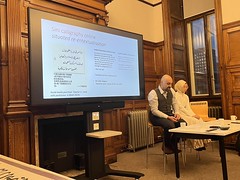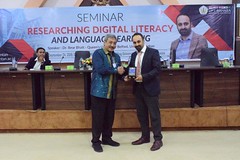Been discussing with Dimi Kaneva (http://dkaneva.wordpress.com) about the idea of doing some posts on the different genres that a doctoral student needs to master. This is because we agreed that it’s not just about doing the thesis, writing papers, etc. but that a doctoral student should also write for non-academic audiences to ensure wider ‘impact’, engage in dissemination strategies, etc.
This first post is about the upgrade, or ‘transfer’, process. Timely since I just completed mine successfully 🙂
The document submitted as part of an upgrade or transfer process in a doctorate is a
particular genre of writing that is sometimes underplayed by doctoral students. As a genre, it represents, among other things, a cogent proposal of your doctorate, its potential implications, and the context of your study. When done effectively, it’s a great way to conceptualise your study: the what, why, how, and so what of it. It addresses why your project is a worthwhile doctoral study, and why YOU are the one who should carry it out.
It can also be accompanied by a pilot study in which you may have tested certain
aspects of your data collection instruments in the field, and analytical methodologies, an upgrade ‘viva’, and a timetable of work.
In dealing with this genre, one of the important things to remember is to set out a clear and cogent reasoning of the claims of the study. Every doctorate should have a ‘claim’ or series of claims, which then ‘anchor’ the thesis. Set out the theoretical space, and methodological approach clearly, and tell the story of your research intentions, your work so far, and what you want to do. Don’t ‘over egg the pudding’ as you can always elaborate in the upgrade viva, and the thesis.
Also, structure this document well, with sections and signposting throughout. It should
read such that an educated person in a related discipline can understand the genesis of your research, and its claims. If you use jargon, then gloss it thoroughly.
If done well, the upgrade document will inspire the chapters of your thesis 🙂
Categories: PhD Reflections











Reblogged this on Education Research @ Leeds and commented:
Reblogging from my own blog
Reblogged this on Dimitrina Kaneva and commented:
This is a post by Ibrar Bhatt, a fellow PhD student at Leeds University. His blog can be found at: https://ibrarspace.net/
Our initial idea was to write several posts about the different types of writing research students should master alongside the big thesis challenge. Here is the first one about the upgrade or as we call it in Manchester Uni. – the panel review.
Last but not least, congratulations to Ibrar for successfully passing his panel!
Enjoy reading 🙂
Yes, that’s a point Dimi: different Universities call this event by different names which tell us something.
In Australia at Deakin University it is called a colloquium document (20,000) words and it is accompanied by discussion with one’s supervisors, Department representative such as Head of Research, and a scholar external to the university where one is studying.
The study has to be ‘worthy of study’ = likely of providing new knowledge, and written demonstrating a grasp of literature reviewal processes, appreciation of the ethics involved, a methodology appropriate to the question cogently described, and all referenced appropriately. I will follow your posts with interests as the thesis genre is something i was challenged by. Best wishes and congratulations Ibrar on this step 🙂
Hi, Ailsa
Thanks for the comment, and the insight into how your University interprets the same stage of development. 20,000 words is quite a bit. My Uni’s requirement of 10k means we have to use Okham’s razor! Not always a bad thing though.
Did you do a pilot study?